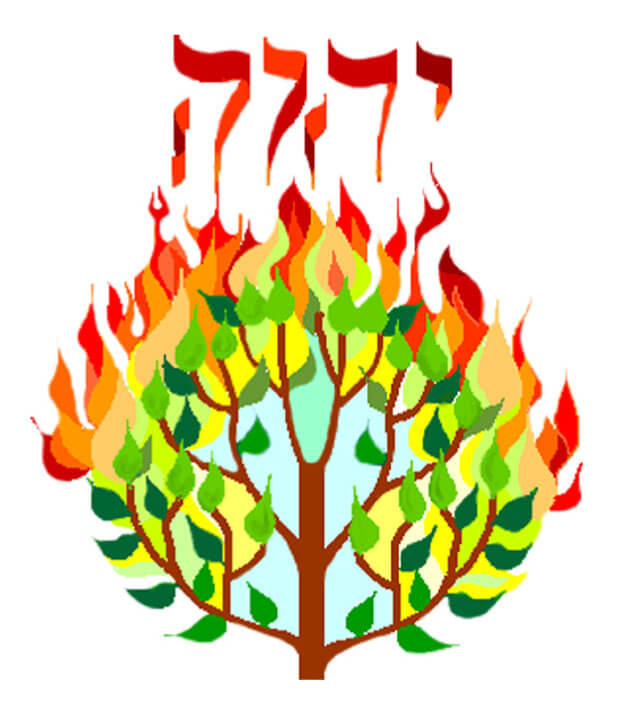
The sight of a bush burning intrigues Moses and draws him closer, yet he hides his face. As Moses meets and speaks with God, he experiences both fascination and fear.
A burning bush.
Moses was tending the flock of his father-in-law Jethro, the priest of Midian. As he led the flock across the desert, he came to Horeb, the mountain of God. There an angel of God appeared to him in fire flaming out of a bush. As he looked on, he was surprised to see that the bush, though on fire, was not consumed. So Moses decided, “I must go over to look at this remarkable sight, and see why the bush is not burned.”
When God saw Moses coming over to look more closely, God called out to him from the bush, “Moses! Moses!” He answered, “Here I am.” God said, “Come no nearer! Remove the sandals from your feet, for the place where you stand is holy ground. I am the God of your ancestors, the God of Abraham, Hagar, and Sarah; the God of Isaac and Rebecca; the God of Jacob, Leah, and Rachel.”
Moses hid his face, for he was afraid to look at God. But the Holy One said, “I have witnessed the affliction of my people in Egypt and have heard their cry of complaint against their slave drivers, so I know well what they are suffering. Therefore, I have come down to rescue them from the hands of the Egyptians and lead them out of that land into a good and spacious land, a land flowing with milk and honey.”
“But,” said Moses to God, “when I go to the Israelites and say to them, ‘The God of your ancestors has sent me to you,’ if they ask me, ‘What is this God’s name?’ what am I to tell them?”
God replied, “I am who causes to be.” Then God added, “This is what you shall tell the Israelites: I AM sent me to you.”
God spoke further to Moses, “Thus shall you say to the Israelites: The Holy One, the God of your ancestors, the God of Abraham, Sarah, and Hagar, the God of Isaac and Rebecca, the God of Jacob, Leah, and Rachel has sent me to you. This is my name forever; this is my title for all generations.”
Exodus 3.1-8,13-15
The bush, burning yet not consumed, preserves a paradox as an image of the holy. Fire suggests power and passion. What heats us up connects with our deepest passions and commitments. Fire both renews and destroys.
Unlike fire, the energy of the holy does not consume, does not use up and exhaust what it burns. The bush lives, and like the bush Moses survives his encounters with God. In the end his own face shines with the reflected presence of the holy.
Israel’s history begins in the groans and outcries to God of the Hebrews enslaved in Egypt. The voice that speaks in the bush reveals a longstanding relationship with Israel’s ancestors, identifies compassionately with the slaves, and seeks their freedom and dignity. God says, “I have seen the misery of my people. I have heard their cry. I have come down to deliver them.”
Moses insists that to convince the enslaved Hebrews God has come to save them, he must know God’s name. Jewish people to this day regard the divine name Yahweh so holy that they never speak it but instead say Adonai. I Am Who Am is a common English translation but carries a static, fixed connotation. In Hebrew the is verb has a causative tense that gives the name the more dynamic sense I Am Who Causes to Be.
- When have you realized your life is holy ground?
- In your experience has suffering or happiness more often led you to change your heart and take up a holy purpose in life?
